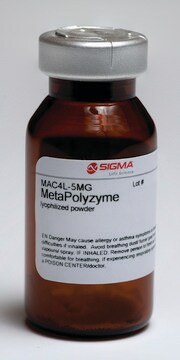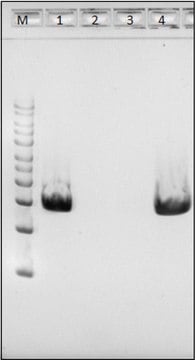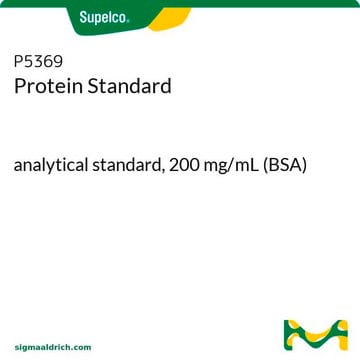SAE0200
MycoPolyzyme
for use with yeast and fungal lysis, free of DNA contaminants, suitable for Microbiome research
Iniciar sesiónpara Ver la Fijación de precios por contrato y de la organización
About This Item
Código UNSPSC:
12352204
NACRES:
NA.77
Productos recomendados
Nivel de calidad
formulario
lyophilized powder
Características
DNA free
Condiciones de envío
wet ice
temp. de almacenamiento
−20°C
Descripción general
Lytic Enzyme Mixture is a mix of two enzymes: lyticase and chitinase, which have been proven useful in fungal and yeast lysis for microbiome studies. Lyticase is preferred to digest cell walls of yeast and generate spheroplasts from fungi for transformation. Chitinases have been detected in many microorganisms and in plants. In fungi, chitinases assist in morphogenesis, to break down the inherent chitin content of fungal cell walls. Plant chitinases help in resistance to fungal attack and counteracting fungal growth, by targeting those same fungal cell walls. In bacteria, bacterial chitinases assist in utilizing chitin as a carbon source and as an energy source. The mixture of the two enzymes has also been tested to ensure absence of microbial DNA.
Aplicación
The study of microbial communities has been revolutionized in recent years by the widespread adoption of culture independent analytical techniques such as 16S rRNA gene sequencing and metagenomics. Since DNA contamination during sample preparation is a major problem of these sequence-based approaches, DNA extraction reagents free of DNA contaminants are essential. Lytic Enzyme Mixture undergoes strict quality control testing to ensure the absence of detectable levels of contaminating microbial DNA using 35 cycles PCR amplification of 16S and 18S rDNA using universal primer sets.
Componentes
The enzymes in Lytic Enzyme Mixture are:
The enzymes are tested for absence of contaminating microbial DNA using 16S and 18S PCR amplification.
- Lyticase
- Chitinase
The enzymes are tested for absence of contaminating microbial DNA using 16S and 18S PCR amplification.
Palabra de señalización
Danger
Frases de peligro
Consejos de prudencia
Clasificaciones de peligro
Resp. Sens. 1
Código de clase de almacenamiento
11 - Combustible Solids
Clase de riesgo para el agua (WGK)
WGK 3
Certificados de análisis (COA)
Busque Certificados de análisis (COA) introduciendo el número de lote del producto. Los números de lote se encuentran en la etiqueta del producto después de las palabras «Lot» o «Batch»
¿Ya tiene este producto?
Encuentre la documentación para los productos que ha comprado recientemente en la Biblioteca de documentos.
Artículos
Enzymatic cell lysis and protoplast prep processes demystified, revealing complex enzymatic reactions during sample preparation.
Nuestro equipo de científicos tiene experiencia en todas las áreas de investigación: Ciencias de la vida, Ciencia de los materiales, Síntesis química, Cromatografía, Analítica y muchas otras.
Póngase en contacto con el Servicio técnico








